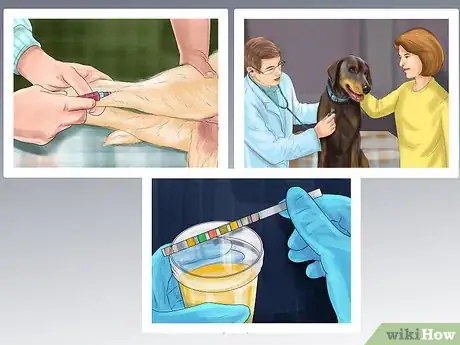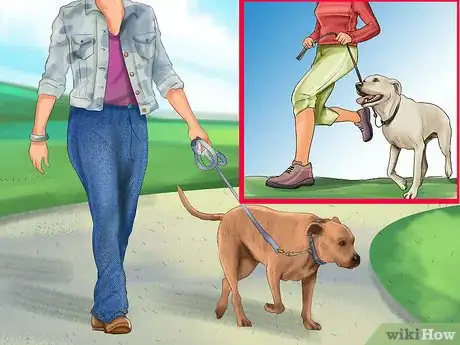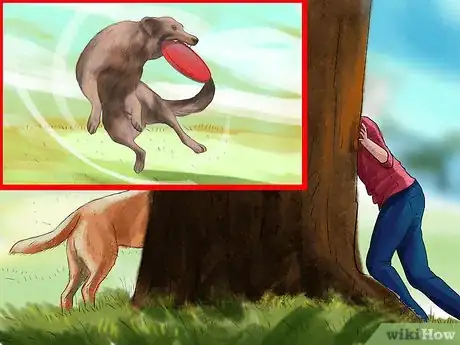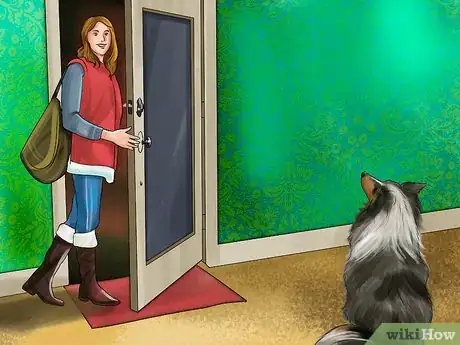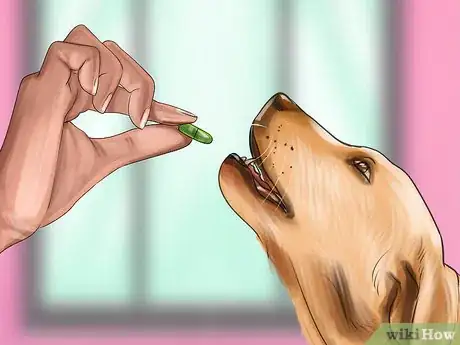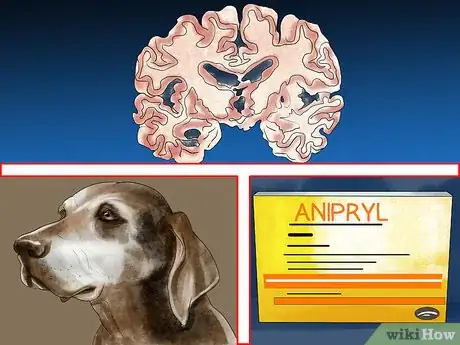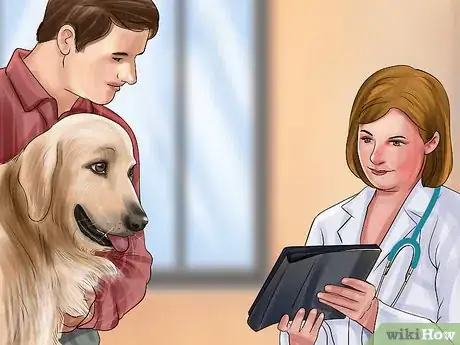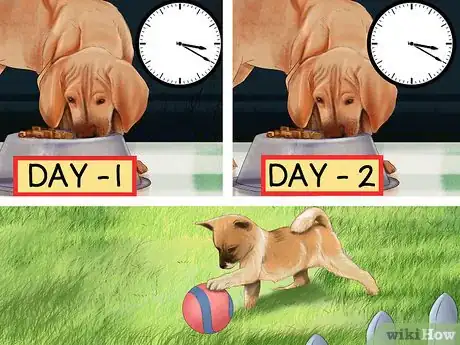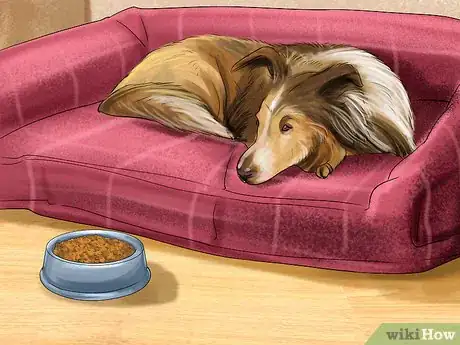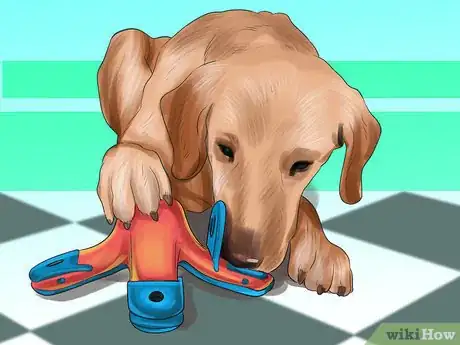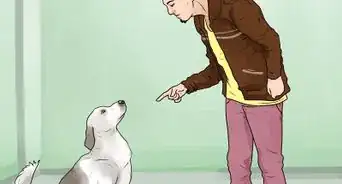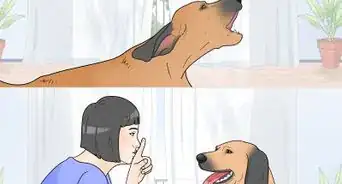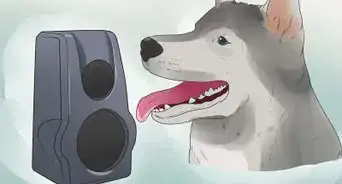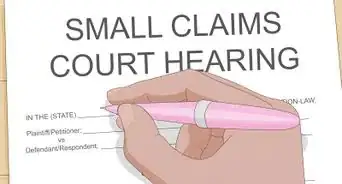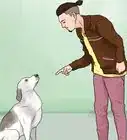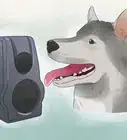This article was co-authored by Elisabeth Weiss. Elisabeth Weiss is a Professional Dog Trainer and owner of Dog Relations NYC, a dog training service in New York, New York. Elisabeth relies on science-based, force-free, and reward-based techniques. Elisabeth offers behavior training, puppy manners, body awareness and injury prevention, diet, exercise and dog nutrition services. Her work has been featured in New York Magazine and on the Dog Save the People podcast. She also trained all the dogs in the movie "Heart of a Dog" by Laurie Anderson that features Elisabeth's journey with Laurie Anderson's and Lou Reed's dog Lolabelle and how her passion for playing the keyboards played a significant role in improving her quality of life after being diagnosed with pancreatic cancer.
There are 8 references cited in this article, which can be found at the bottom of the page.
This article has been viewed 19,799 times.
A dog will howl for several reasons, including communicating with other dogs, getting attention, and expressing distress or anxiety.[1] Older dogs may howl because of separation anxiety, dementia (also known as cognitive dysfunction), or a painful medical condition. If your older dog is howling, work on reducing its howling by relieving its anxiety, addressing medical issues, and helping it feel comfortable at home.
Steps
Relieving Your Dog’s Separation Anxiety
-
1Take your dog to your vet. Even if your dog's howling has you at your wit’s end, do not try to reduce the howling before seeing your vet. Your vet can determine whether the howling’s cause is behavioral or medical. They will perform a physical exam and run various diagnostic tests (blood work, urinalysis, x-rays) to rule out medical causes, such as arthritis or kidney disease.
- During the appointment, give your vet a history of the howling, including when it started, when it usually occurs (during the night, when you leave the house), and if it’s gotten more frequent.
- If your dog does not have medical problems, then a behavioral issue is the likely cause of the howling.
-
2Exercise with your dog. Separation anxiety is common in older dogs.[2] If your vet diagnosed your dog with separation anxiety, you can relieve this anxiety at home in several ways, such as exercising. The physical demands of daily exercise will help your dog feel less anxious and reduce anxiety-induced howling. Examples of exercises include:
- Twice-daily walks
- Runs, if your dog is physically able to run
Advertisement -
3Have playtime with your dog. The fear of being alone can make a dog feel anxious and start howling. If your older dog has anxiety-induced howling, it could be calling out for you, even when you’re not home. Regular, daily playtime will give your dog the attention it needs from you to feel more relaxed and howl less. Try these playtime ideas:
- Fetch, if your dog can easily run and jump
- Hide and seek
- Teaching new commands
-
4Leave your home without fanfare. Separation anxiety is often associated with a dog owner leaving the house. If your older dog howls when you leave, reduce its howling by teaching it that your departure is no big deal:[3]
- Go through your normal departure routine (grabbing your keys, putting on your coat) without actually leaving the house. Practice this a few times a day.
- Leave the house for short periods of time, maybe as short as 10 seconds, then come back in when your dog stops howling. Reward your dog with a treat after the howling stops. Gradually increase the amount of time that you leave the house.
- Be patient. It may take weeks or months before your dog stops howling when you leave the house.
-
5Give your dog anti-anxiety medication. For some older dogs, the separation anxiety is so severe that behavioral changes aren’t enough. If your dog’s anxiety-induced howling hasn’t lessened, take your dog to your vet. Your vet will prescribe an anti-anxiety medication.[4]
- Realize that medication alone will not relieve your dog’s anxiety or reduce the howling. Continue with the behavioral strategies after you start your dog on the anti-anxiety medication.[5]
Addressing Medical Causes of Howling
-
1Administer pain medication. If your vet identified a medical problem as the cause of your dog’s howling, treating that problem will help reduce the howling. Older dogs can develop arthritis, which can be so painful that a dog will howl with distress.[6] If your dog has arthritis, your vet will prescribe an anti-inflammatory medication to reduce the pain.[7]
- After experiencing pain relief, your dog may not howl so much.
- Administer the pain medication as prescribed so your dog gets the maximum benefit from the treatment.
-
2Treat your dog’s dementia. Howling, especially at night, is a common symptom of dementia in older dogs. Although dementia has no cure, medication can help reduce the symptoms. If your dog has dementia, your vet will prescribe a drug called Anipryl, which improves brain function in dogs.[8]
- Anipryl probably won’t make your dog’s howling stop completely. However, it can help reduce the howling.
-
3Follow-up with your vet. Let your vet know if the medications are helping to reduce the howling. If your dog’s howling is still the same, your vet may need to adjust the drug dosage or prescribe a different type of medication.
Helping Your Dog Feel Comfortable at Home
-
1Keep a predictable routine. Older dogs, especially those with dementia, do not always adjust well to change. A new routine can be disorienting and stressful, which could lead to howling. Keep your dog’s daily routine the same by performing activities (feeding, walking, playing) at the same time each day.[9]
- Having a consistent routine will help your dog feel relaxed and confident with what will happen each day.
-
2Make your dog’s living area comfortable. A comfortable physical environment will also help your older dog feel at ease and less likely to howl. Give your dog its ‘creature comforts,’ such as favorite toys and comfortable bedding. If your dog has trouble getting around, place its food and water bowls near its bed so it doesn’t have to walk so far to eat and drink.
-
3Enrich your dog’s environment with toys. Dogs love to play. You can help your dog feel more comfortable by giving it lots of toys. If your dog is comfortable and stays mentally busy, it may not howl so much.[10] Give your dog a variety of toys to play with and rotate them regularly to prevent boredom:[11]
- Give your dog a food puzzle toy, which will be a mental challenge for your dog and keep it busy for a long time.
- Chew toys will also keep your dog busy and entertained.
Expert Q&A
-
QuestionHow do you get an older dog to stop barking?
 Osama MaghawriOsama Maghawri is a Dog Trainer and Founder of OneStopK9, a dog training service in Miami, Florida. Osama utilizes balanced training methods to teach communication between owners and dogs. He specializes in basic obedience and behavioral issues such as resource guarding, fear-based aggression, and leash reactivity. Osama also helps owners understand the behaviors of their breed and how to continue training on their own in the future.
Osama MaghawriOsama Maghawri is a Dog Trainer and Founder of OneStopK9, a dog training service in Miami, Florida. Osama utilizes balanced training methods to teach communication between owners and dogs. He specializes in basic obedience and behavioral issues such as resource guarding, fear-based aggression, and leash reactivity. Osama also helps owners understand the behaviors of their breed and how to continue training on their own in the future.
Professional Dog Trainer Try teaching your dog the quiet command. When your dog starts to howl, say "quiet." Once they've been quiet for about 5 seconds, reward them. Then, keep practicing until they understand the command.
Try teaching your dog the quiet command. When your dog starts to howl, say "quiet." Once they've been quiet for about 5 seconds, reward them. Then, keep practicing until they understand the command. -
QuestionCan you still train an older dog?
 Osama MaghawriOsama Maghawri is a Dog Trainer and Founder of OneStopK9, a dog training service in Miami, Florida. Osama utilizes balanced training methods to teach communication between owners and dogs. He specializes in basic obedience and behavioral issues such as resource guarding, fear-based aggression, and leash reactivity. Osama also helps owners understand the behaviors of their breed and how to continue training on their own in the future.
Osama MaghawriOsama Maghawri is a Dog Trainer and Founder of OneStopK9, a dog training service in Miami, Florida. Osama utilizes balanced training methods to teach communication between owners and dogs. He specializes in basic obedience and behavioral issues such as resource guarding, fear-based aggression, and leash reactivity. Osama also helps owners understand the behaviors of their breed and how to continue training on their own in the future.
Professional Dog Trainer Yes! Dogs of all ages can be trained, but you will need to be patient with them since they're a bit more set in their ways.
Yes! Dogs of all ages can be trained, but you will need to be patient with them since they're a bit more set in their ways.
Warnings
- Do not punish your older dog for howling. This could make the howling worse, especially if the howling is due to anxiety.⧼thumbs_response⧽
References
- ↑ http://www.akc.org/content/entertainment/articles/why-do-dogs-howl/
- ↑ http://www.peteducation.com/article.cfm?c=2+2110&aid=616
- ↑ http://www.peteducation.com/article.cfm?c=2+2110&aid=616
- ↑ http://www.peteducation.com/article.cfm?c=2+2110&aid=616
- ↑ http://www.vcahospitals.com/main/pet-health-information/article/animal-health/separation-anxiety-in-dogs/172
- ↑ http://www.peteducation.com/article.cfm?c=2+2110&aid=616
- ↑ http://www.2ndchance.info/arthritis2.htm
- ↑ http://www.veterinarypartner.com/Content.plx?A=2549
- ↑ https://www.vetinfo.com/diagnosing-canine-dementia.html
- ↑ Elisabeth Weiss. Professional Dog Trainer. Expert Interview. 3 September 2020.
- ↑ http://www.vcahospitals.com/main/pet-health-information/article/animal-health/separation-anxiety-in-dogs/172
- ↑ http://www.akc.org/content/entertainment/articles/why-do-dogs-howl/
- ↑ Osama Maghawri. Professional Dog Trainer. Expert Interview. 9 September 2020.
About This Article
To reduce your older dog's howling, spend more time exercising and playing with it in case it's experiencing separation anxiety. However, if you've made behavioral changes and your dog's howling has still not improved, you may want to talk to your vet about anti-anxiety medication for your dog. You should also take your dog to the vet for assessment if you think that pain or a medical issue, like dementia, is causing its howling. If your dog has dementia, your vet will most likely recommend you give it a drug like Anipryl, which improves brain function in dogs and could reduce the howling. For more tips from our Veterinary co-author, including how to help your older dog feel comfortable at home to reduce howling, keep reading!
